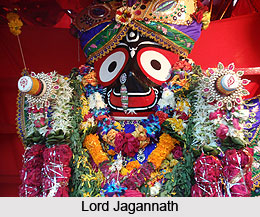 Mukunda Dev was the king of Puri from 1879-1926. Mukunda Dev was a minor at the time of his father`s death. So his grandmother, Suryamoni Patmahadei acted as his guardian and managed the temple on his behalf until he became 18 years of age. He had been the king of Puri for nearly 30 years. Mukunda Deva gave very little time to the supervision of the temple affairs because he had almost no interest in all these. As a result the mismanagement which had begun long before his reign continued. So the government in order to restore proper management in the temple appointed a manager of the temple and the management of the temple remained in the hands of the manager throughout the period of his reign.
Mukunda Dev was the king of Puri from 1879-1926. Mukunda Dev was a minor at the time of his father`s death. So his grandmother, Suryamoni Patmahadei acted as his guardian and managed the temple on his behalf until he became 18 years of age. He had been the king of Puri for nearly 30 years. Mukunda Deva gave very little time to the supervision of the temple affairs because he had almost no interest in all these. As a result the mismanagement which had begun long before his reign continued. So the government in order to restore proper management in the temple appointed a manager of the temple and the management of the temple remained in the hands of the manager throughout the period of his reign.
At the same time it can be said that although Mukunda Dev unlike his ancestors had little interest in the temple management, he upheld the royal behaviours in his personal life. He kept his family tradition as paramount and the divine King of Orissa untarnished. He kept himself aloof from the public. All royal rituals were observed in the traditional manner during his visit to the temple.
With regard to the personal life of Mukunda Deva it is said that he led an abstemious and orthodox life rigidly observing untouchability. He was fond of pets. Mukunda Dev did not maintain separate palace treasury. The property, money and other kinds of wealth at his disposal were primarily from the endowment estates owned by the Lord Jagannath. Because of his extravagance the rituals in the temple could often not be properly performed. As a result economic crises were frequent and service in the temple also disintegrated. But the king was very particular about the daily rituals and worship regularly and dedicatedly.
During the reign of Mukunda Dev only a few minor kings of princely states such as Badama, Tigiria, Dasapalla, Nayagarh, Ranpur and a few others attended the installation ceremony and performed their duties in the traditional manner. The New Year`s Day was observed in the traditional manner except that the minor kings did not attend this in full strength.
It is during the rule of Mukunda Deva that each class of the temple functionaries formed its own association called Nijoga to organise duties, recruit new functionaries and maintain internal discipline. Each Nijoga through its members conducted pilgrims of the regions which were under its charge around the temple imbibing them with the importance of the Jagannath cult and thereby spreading its veneration throughout the country.
In spite of all problems Mukunda Dev was considered a divine king by the people of Orissa.






